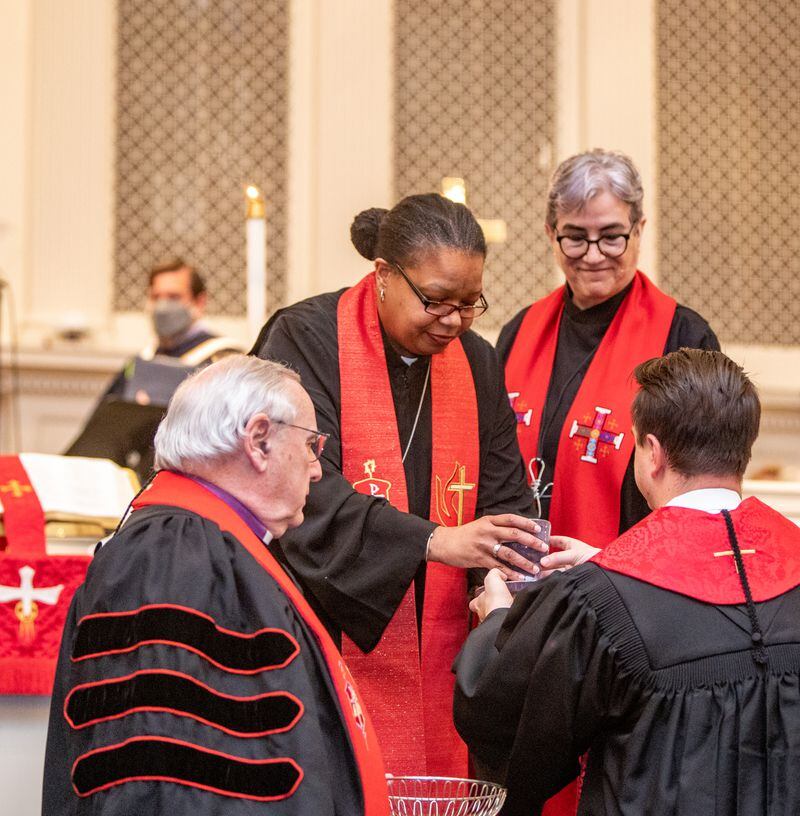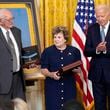The Rev. Michael D. Stinson, lead pastor of East Point First Mallalieu United Methodist Church, sees a new future for the North Georgia Conference of the United Methodist Church.
Stinson was among more than 1,500 people who packed a ballroom in Classic Center in downtown Athens for the 2024 annual meeting. It’s the first conference meeting since the denomination struck down the church’s controversial prohibitions around homosexuality, which has driven away many of the denomination’s churches over the past two years.
Disaffiliation was not on the agenda for the two-day annual conference, which ends Saturday. The deadline for local churches to leave for reasons of conscience regarding practice of homosexuality, same sex marriage or ordination of gay clergy was in December.
Stinson remarked that the spirit throughout the Classic Center in downtown Athens “is good because we’re not having those discussions. We’re celebrating those who are retiring and those who are coming in as ordained ministers and divisional leaders.”
He added, “It’s sad for those who have left, but we understand why.” As for the future, “only time will tell if it will be a positive, productive future or not.”
Today, the UMC North Georgia conference has about 440 churches remaining — but nearly a dozen new congregations are forming. Since 2022, more than 330 churches have left, which was about 38% of the conference’s churches. The smaller South Georgia Conference of the UMC has lost about half of its congregations since 2020.
Stinson said there may be more discussions about disaffiliations next year when the North and South Conferences for the UMC in Georgia will vote on ratifying “regionalization”: a plan to break up governance of Methodist churches into smaller geographic areas.
What does the future look like for those who stayed?
“In some ways it’s just the regular work of the church,” said the Rev. Anjie Woodworth, the incoming pastor of Eastside UMC in Atlanta. “This is a shift and a change and it’s uncomfortable for some of our folks.” Those who lean more traditionalist and stayed may not be comfortable with the changes, she said.
Those who wanted to be more inclusive and fought for it for a long time are ready to celebrate “and if you are a clergy person who has had to live in the closet for years, it’s not as easy as flinging open the doors and coming out of the closet, particularly if you’re serving a church that’s not prepared for that,” Woodworth said.
Such work takes time.
She said some congregations, especially in the Southeast, may still be uncomfortable with having clergy who are Black, Hispanic, Asian or female. For LGBTQ clergy, it adds an additional layer.
The Rev. Lonnie L. Thornton, retired pastor of Rust Chapel UMC in Greenville, Georgia, saw many old friends at Friday’s meeting, and missed a few who left because of disaffiliations last year.
“It’s sad to see people who I thought were grounded in the Wesleyan tradition no longer want to be United Methodists, but United Methodists are still surviving and thriving. I see it (the denomination) getting stronger. ... If someone still wants to leave, it’s like a marriage. If you’re so dissatisfied, just leave.”
Many who left became independent, joined other Methodist denominations or the more conservative Global Methodist Church. There have been reports that some churches that decided to stay with the UMC are having second thoughts.
David Gibbs is an attorney who represented roughly 200 churches that sued the North Georgia Conference in order to restart the process to let congregation vote on disaffiliation. The North Georgia Conference in December temporarily halted requests to leave, citing “factually incorrect and defamatory” information circulating about the process for disaffiliation.
Gibbs said he has been contacted by churches around the nation, including some in Georgia, who now want to leave after the actions taken during the General Conference of the UMC, held in May.
During that gathering, Methodist leaders from around the world voted to remove language in the United Methodist Church’s Book of Discipline that had said homosexuality was “incompatible” with Christian teaching. For decades, the issue of human sexuality and full inclusion of the LGBTQ community has sharply divided the denomination, which has 10 million members worldwide. That sentence was added in 1972
The church’s laws, contained in the book, banned the ordination of “self-avowed practicing homosexuals” as clergy, and banned the performance of same gender marriages. It also imposed penalties and punishment for those doing so. At the global conference, delegates approved a new definition of marriage as a covenant between “two people of faith” while recognizing the couple may or may not involve a man and a woman. That replaces an exclusively heterosexual definition of marriage.
Carolyn D. Crew hasn’t changed her mind about homosexuality and considers it a sin. “I’m not used to it. Personally, I do not approve, but all of us are God’s children,” she said.
Crew, an 87-year-old retired teacher, though,” doesn’t plan the leave the denomination.
“I think with prayer you can overcome anything.”
Credit: Jenni Girtman
Credit: Jenni Girtman
Other matters at the 2024 annual meeting:
--During the annual conference 1,300 delegates — both clergy and laypersons — voted overwhelming to move from its current offices on Century Circle in Atlanta to Sugarloaf United Methodist Church in Duluth, in mid-September.
--Last November at a special session, the annual conference did not grant the disaffiliation request of The Fountain at Sugarloaf UMC. Sustaining the large campus was unrealistic for the small number of members, so the North Georgia Conference assumed the mortgage payments on the property in February. In May, the members of the church voted to close and will transfer their membership to other United Methodist churches.
--Delegates voted to approve the 2025 budget, which is 25% lower, largely due to revenue lost because of disaffiliation. No staff layoffs are planned. The conference has reduced staff through attrition over the past few years. .
--Jan Love, who is retiring as dean of Emory University’s Candler School of Theology after nearly 17 years, was honored. Love will step down from that role when her current term ends in late summer 2024. She plans to remain on the school’s faculty for a sabbatical year and retire in the summer of 2025.








